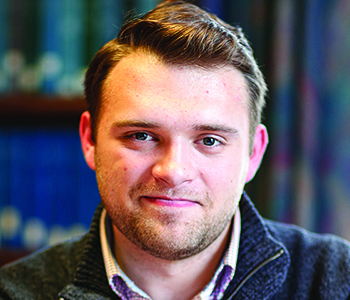As Cooper Smith ’23 walked past Lilly Library during a visit to Wabash, he had a thought: This is where I belong.
Cooper Smith’s list of accomplishments during his tenure at Wabash is long and impressive.
He won Moot Court twice—as a freshman and junior. He earned double distinction on his senior comprehensive exams. He earned two competitive international fellowships, the Truman Scholarship as a junior, providing substantial funding for graduate school, and the Marshall Scholarship as a senior. The two-year Marshall Scholarship will support him through his studies in St. Andrews, Scotland, and London beginning this fall.
 The political science and history major has also been accepted to Yale Law School.
The political science and history major has also been accepted to Yale Law School.
“The past four years have been beyond what I could have even hoped for,” he says. “I’m in the exact spot I wanted to be. I have a strong team of mentors and friends. I’m excited for the challenge ahead.”
In addition to being a section leader in the Glee Club, Smith has also reenergized The Bachelor as its editor in chief.
Jim Amidon ’87, chief of staff and director of strategic communications, says it was impressive to watch Smith recruit, motivate, and develop a vast cadre of writers, designers, and photographers whose abilities ranged from novice to brilliantly talented in his early weeks as the editor.
“Not only did he build the largest staff in a decade, his team included fraternity and independent men, international and students of color, athletes and artists,” says Amidon, who also serves as the student newspaper’s advisor. “This year’s Bachelor reflects a rich diversity of interests, but also Cooper’s thoughtful vision and his genuine commitment to collaboration.
“Cooper’s intellect, energy level, and constant thirst for knowledge combine to form a remarkably thoughtful and mature young man,” says Amidon. “And while he is usually the smartest person in the room, he is kind and patient, a thoughtful listener, and a genuinely nonjudgmental leader.”
Calling himself an “obsessive planner,” Smith says he weighed options endlessly to extremes and just took one step at a time.
“It may look like it’s a really calculated plan from start to finish, but I’m not playing 4-D chess here,” he says. “I make one decision at a time.”
“I was fascinated to meet someone who had such a spark for learning, infinitely so,” says Benjamin Bullock ’23, Smith’s roommate of four years. “I’ve never met someone who from the get-go was quite so driven, and knew what he wanted to do from the beginning. He didn’t have everything exactly spelled out, but at least knew the direction he was going. He’s always had direction.”
The series of choices Smith has made have served him well, but internship experiences cemented his path. In the summer of 2021, he had two internships—one with the Innocence Project of Florida and the second with Legal Aid Society of Louisville, Kentucky—focusing on wrongful convictions and poverty law.
His desire to work with the Innocence Project stemmed from research done in preparation for a high school debate tournament. Reading stories of wrongful convictions lit “a fiery conviction” to get involved. He saw firsthand how the approach to criminal justice often intersects with economic justice.
“I’ve worked on wrongful convictions in northern Florida. I’ve worked on poverty law in Kentucky,” he says. “Those opportunities, coupled with where I grew up, prepared me to be a different type of advocate.”
After the pandemic hit, he struggled with the idea that the hurdles for poverty law clients are already high, but for many poor Americans, conditions only got worse. The native of Sellersburg, Indiana, jumped at an opportunity to work at the Legal Aid Society in Louisville for former senior attorney Nick Maraman ’10.
“My experiences working in and around Louisville have really shaped how I think about law as a force for good and how I envision solutions to common crises,” he says. “My work with the Legal Aid Society helped confirm law was both the right career path for me, but also that law could be a tool for social good.”
Working with clients in both places, talking regularly with people in prison, sharpened his focus that this is the work he should be doing.
“There are confirming moments where you just know you’re on the right track,” he says. “I could read hundreds of pages of trial transcripts of evidence, but they were the only people who had lived their cases, and meeting with them, hearing their stories, really confirmed for me that this is the line of work I want to go into.”
Smith is committed to a career in law marked with public service, although he is not sure exactly what that will look like—nonprofits, government, perhaps teaching.
He is a genuinely curious person eager to continue learning as he connects with new people and places. That curiosity was fostered originally by his parents, both teachers and now in academic administration, who placed tremendous value on education.
“Curiosity is a big part of understanding who I am,” he says. “I have tons of interests. I love exploring new ideas and new experiences.”
Smith is also quick to credit the shared Wabash experience for so much of what he has accomplished.
“Wabash helped me discover who I am and who I see myself to be in the future,” he says. “It has taught me how to think, how to love, and how to be a good citizen of a community. These past four years have been a big journey of self-discovery.” .